Som Tam is a popular Thai salad featuring green papaya and a spicy chile pepper dressing. The multitude of flavors from this salad explode in your mouth—sweet, tart, crunchy, and a touch of spiciness—the perfect side dish or a light entree.
Traditionally, Som Tam is pounded with a mortar and pestle, which can be fun at times. However, it’s also messy and a lot of work. To make this tasty green papaya salad much easier to toss together, simply turn to your handy food processor or chopper. This Thai recipe was adapted for that modern convenience and there is very little difference in the taste.
Top it with shrimp or chicken for a full meal or eat it with sticky rice as is frequently done in Thailand.
What is Som Tam
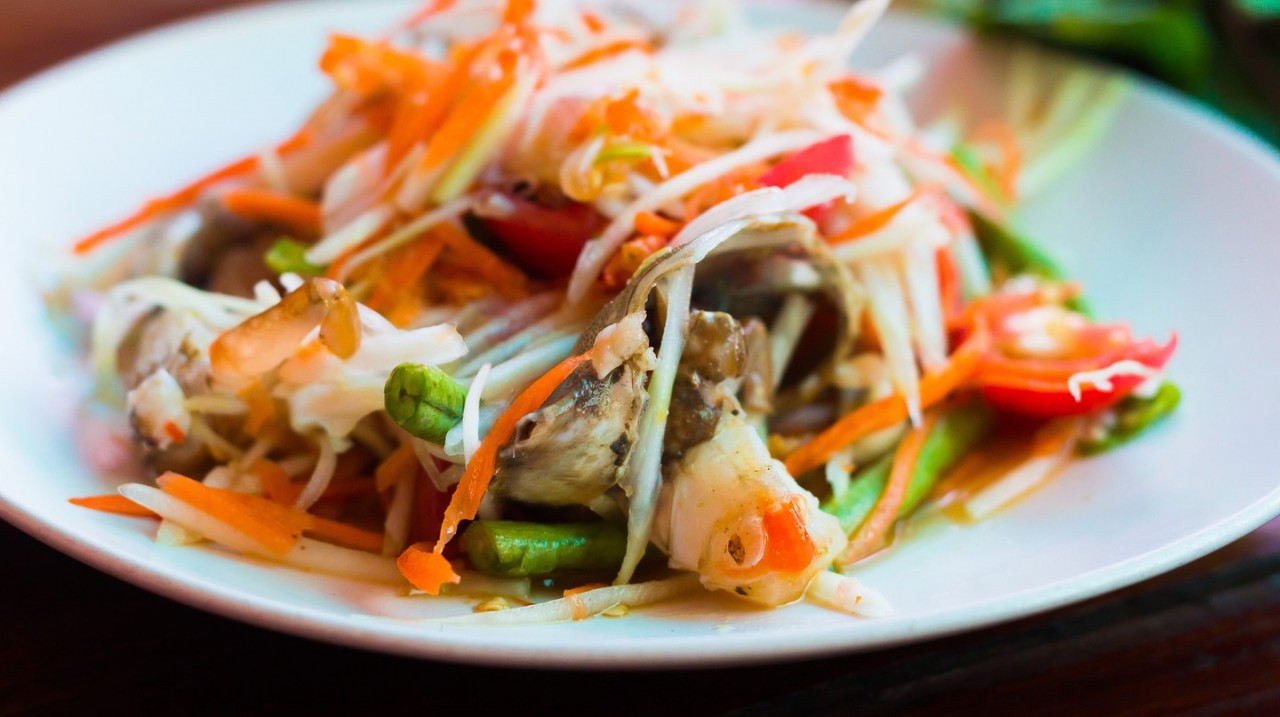 |
| Photo: Green papaya salad | © xegxef / Pixabay |
Som tam is a Thai papaya salad. Don’t confuse Thai salads with the boring leafy salads the rest of the world enjoys. Like most Thai food, som tam teases the taste buds with its sweet, spicy, salty and sour elements.
Som Tam is served in restaurants and by vendors at street markets all over Thailand. Each region has a different version of the savoury dish, so be sure to order som tam in every city you visit.
Many vendors will prepare som tam in front of you. Don’t be afraid to ask the chef to use mild peppers. Not everyone’s palate is accustomed to the signature spiciness of Thai food.
History
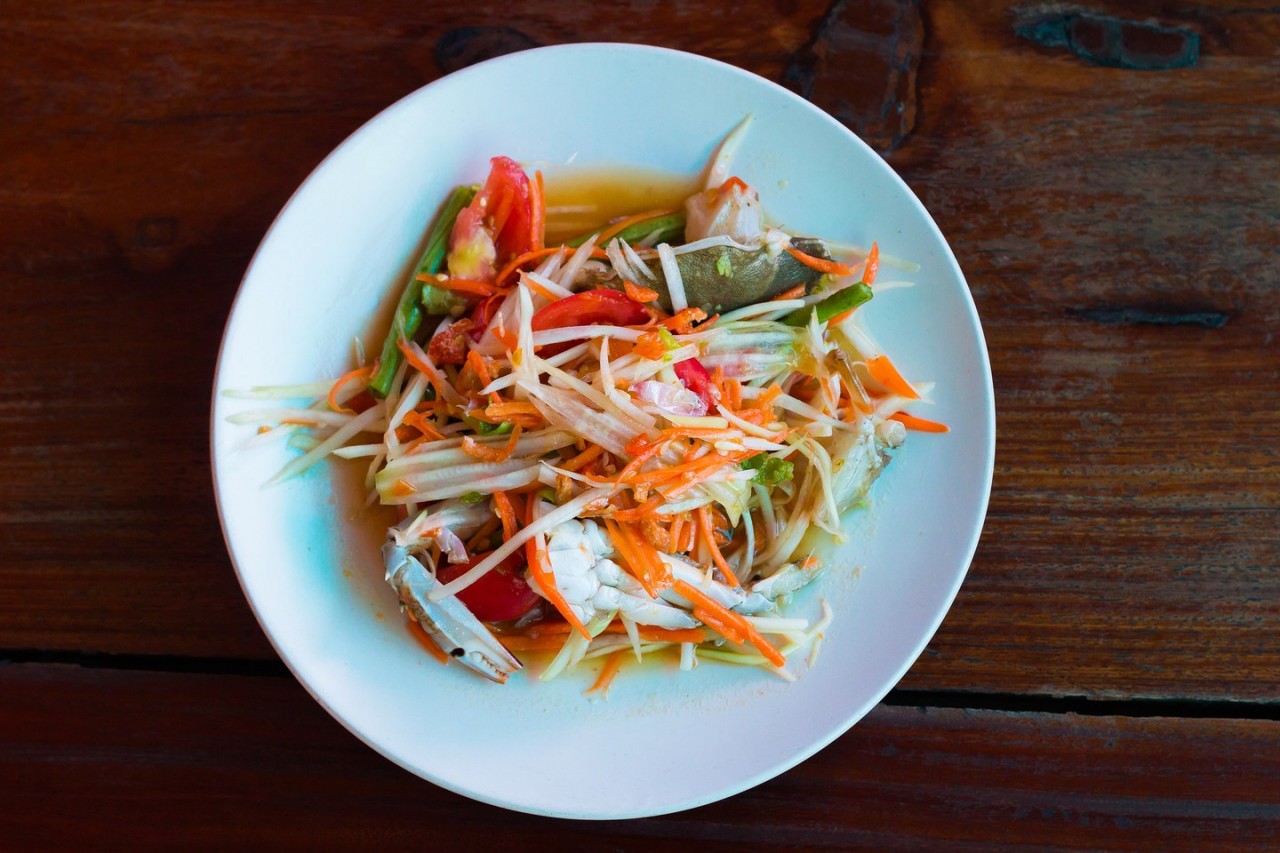 |
| Photo: Food Thai | © xegxef / Pixabay |
Papaya salad is not only a signature dish in Thailand but also a popular one in Cambodia, Laos, and Vietnam, though the Thai version is certainly the most famous. Food historians believe the dish originated in Thailand’s northeast neighbor of Laos, which might be why green papaya salad is one of the most popular dishes in Isaan, the northeastern region of the country. As the largest region in Thailand, many of the most remarkable of dishes commenced their journey into the foodie scene from this rarely visited area.
The dish in Laos is known as tam maak hung, and though it is similar to Thailand’s version, there are a few things that differ. Instead of using fish sauce, for instance, Laos vendors add in a fermented fish paste, which is much more overpowering and oftentimes not well liked by visitors who have yet to acquire a Laos palate. Green eggplants are also added to papaya salad in Laos, and it is generally not as sweet as Thailand’s version, though they are equally as spicy. While some Thai restaurants offer papaya salad, it is popularly known as a street food.
Preparation of Som Tam
The dish combines the five main basic tastes: sourness of the lime, the spiciness of the chili, saltness and savoriness of the fish sauce, and sweetness of palm sugar. The ingredients are mixed and pounded in a mortar, which is reflected in the Khmer, Lao and Thai names for the dish that literally mean “pounded papaya”.
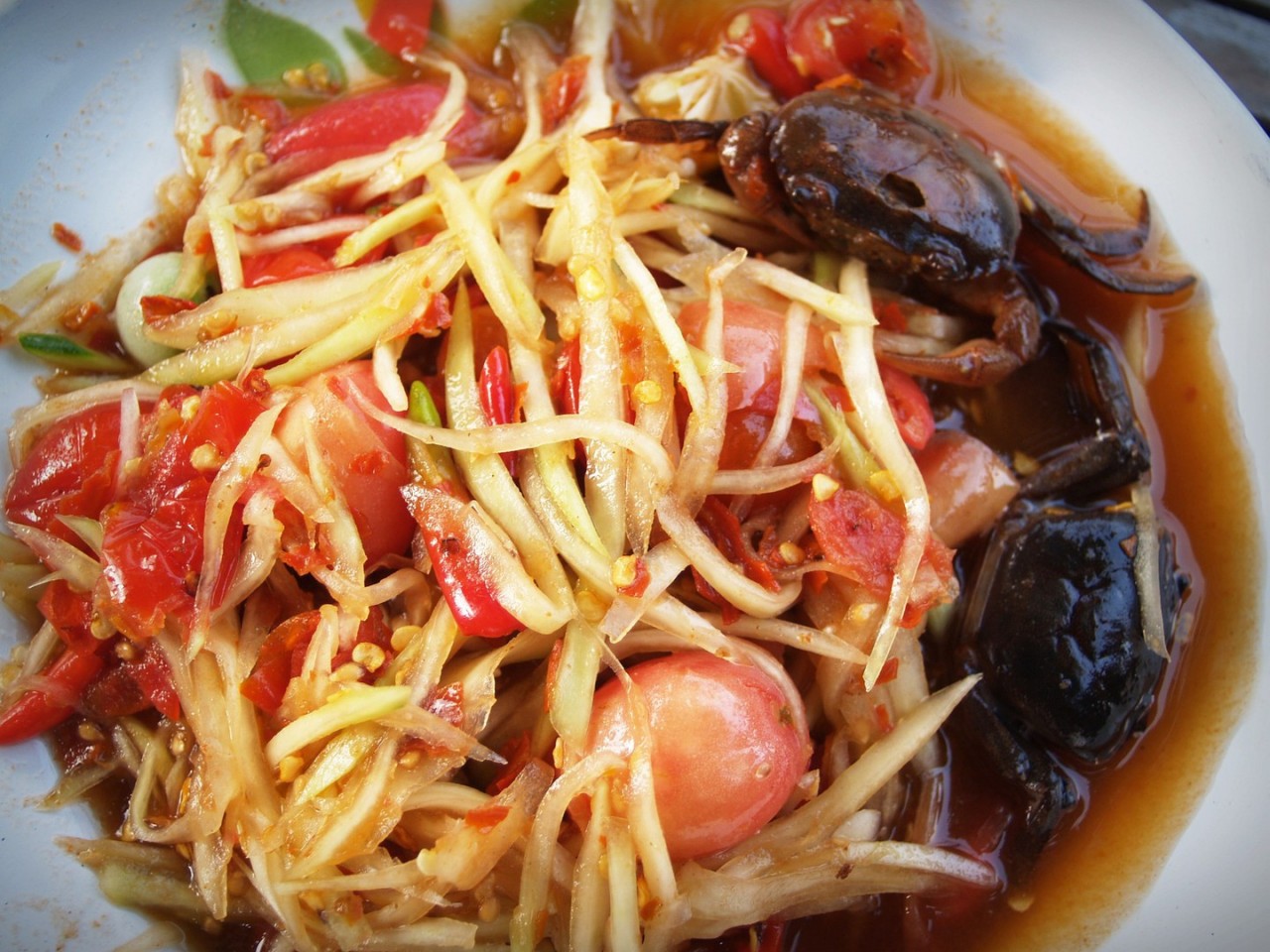 |
| Photo: Freeimages9 / Pixabay |
In Laos, green papaya salad is one of the traditional staples of the Lao. Pounded salads in Laos all fall under the parent category of tam som, which may or may not contain green papaya, however, when no specific type of tam som is mentioned, it is generally understood to refer to green papaya salad. For absolute clarity, however, the name tam maak hoong may be used, since this name means “pounded papaya”.
In Thailand, it is customary that a customer ask the preparer to make the dish suited to his or her tastes. To specifically refer to the original style of papaya salad as prepared in Laos or Isan, it is known as ส้มตำลาว or som tam Lao or simply as tam Lao and the dish as prepared in central Thailand may be referred to as som tam Thai.
Traditionally, the local variety of green papaya salad in the streets of Bangkok is very spicy due to the addition of a fistful of chopped hot bird’s eye chili. However, with its rising popularity among tourists, it is now often served less spicy as it used to be in the past.
What Foods Pair Well With Som Tam?
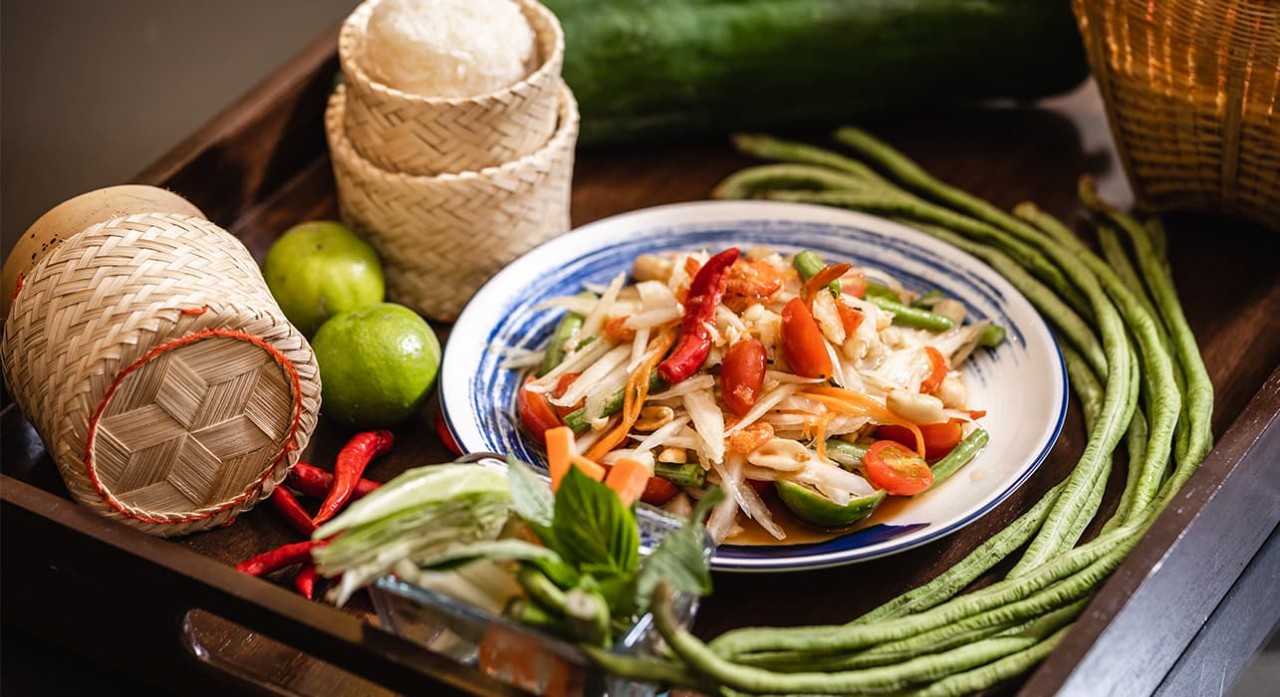 |
| Photo: akyra Hotels |
A unique pairing of ingredients makes som tam as fragrant as it is delicious. It can be enjoyed alone or as part of a larger meal. Fish and grilled chicken are usually added to som tam, but some chefs serve som tam with soft-shell crabs or chicken wings.
Som tam is almost always served with sticky rice. Sticky rice takes away the sting of the hot peppers.
The perfect Sam Tom
Put a small frying pan on a medium-high heat. Rinse the shrimp, pat dry and then dry fry for about four minutes until crisp. Tip out and toast the peanuts until browned, then tip out, roughly chop and set aside.
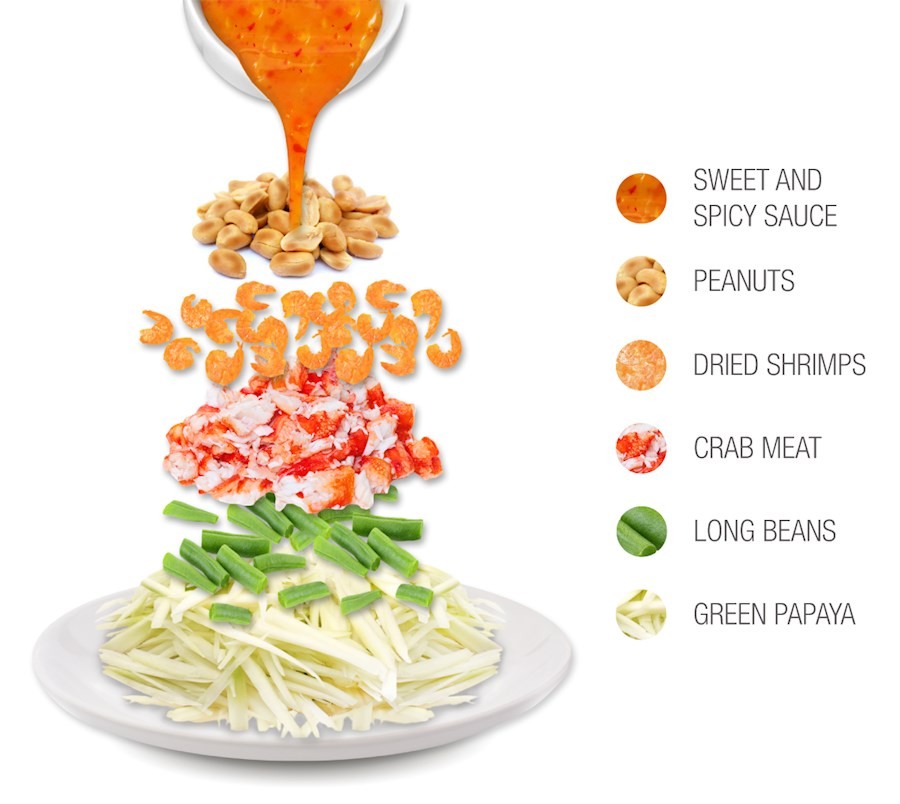 |
| Photo: TasteAtlas |
Mash the garlic with a pinch of coarse salt in a pestle and mortar, then add the shrimp and two thirds of the peanuts and crush to a rough paste. Add the chillies and merely bruise (unless you want it really spicy, in which case pound away).
Add the beans, tomatoes and lime wedges to the mortar and roughly bruise with the pestle, then scoop the lot out into a bowl (unless you have a very large pestle and mortar in which case you can leave them in).
Peel the papaya and cut into narrow matchsticks; a julienne peeler or mandoline is ideal, but you can use a sharp knife if not. Working in batches if necessary, lightly bruise in the pestle and mortar then add to the bowl.
Mix the lime juice, tamarind water, fish sauce and sugar in the mortar until the sugar has dissolved, then taste; it should be a balance of sour, salty and sweet. Adjust as necessary.
Toss the dressing and the salad ingredients together, making sure the peanut paste is well distributed, and sprinkle with the remaining peanuts before serving.
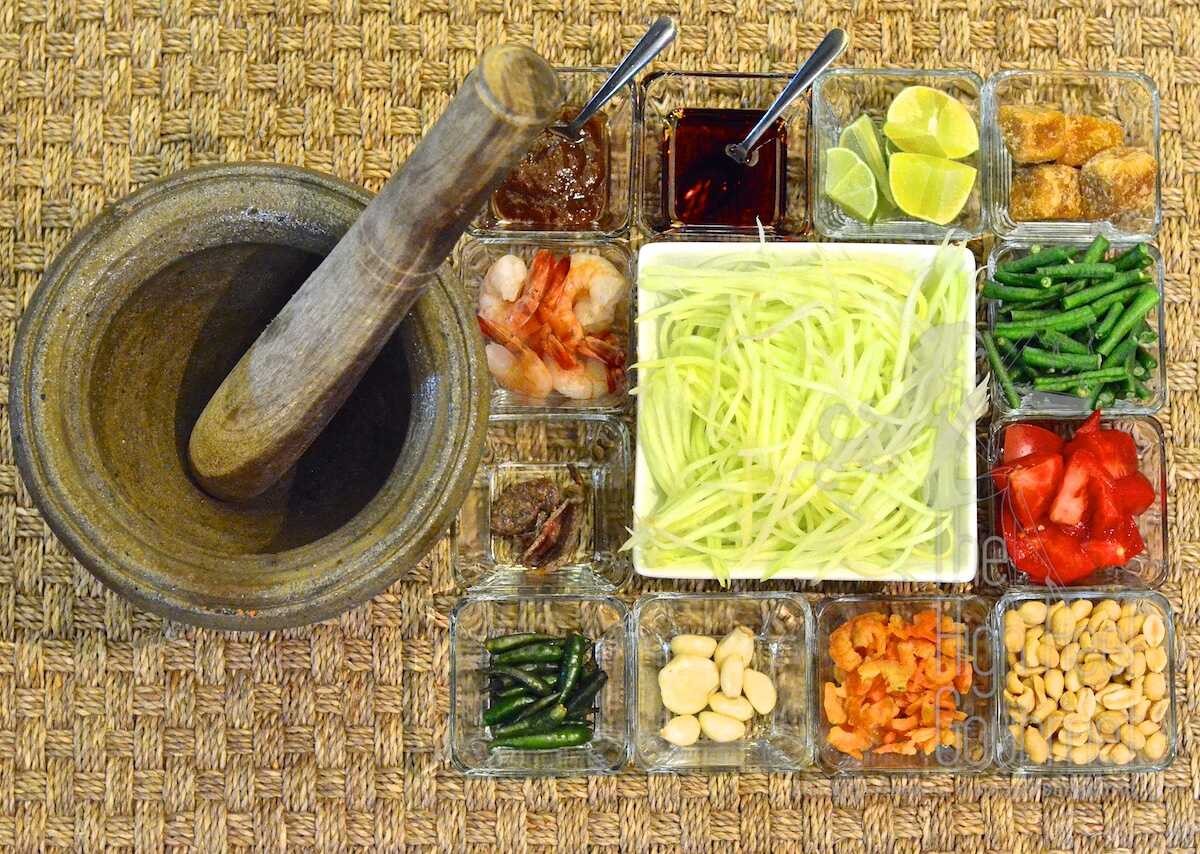 |
| Photo: The High Heel Gourmet |








